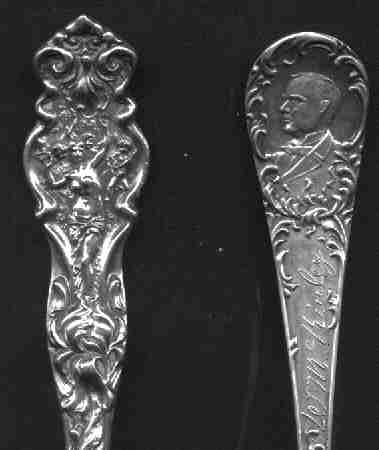
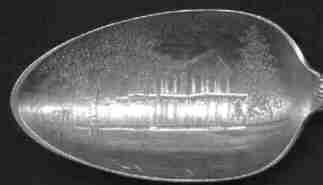
I have two views of the President McKinley house. They are very similar, but because they are hand engraved they do show differences. The handles are quite different and unique. It is hard to see, but the first one has a bare breasted mythological female with cherub heads in her hair (irian pattern). The right handle has a portrait of McKinley and his name on the handle. For some reason, the "stiff" McKinley does not see to be a good match with the Victorian Irian pattern, or am I just applying my 21 st century feelings to a 19th century product?
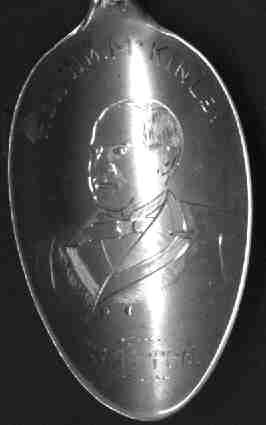
engraved portrait of William McKinley
on a Ohio state wavy handled Shepard spoon
President McKinley did not go on the "campaign trail", instead he conducted his campaign from the house. He was the first presidential campaigner to use "mass marketing techniques" and he relied on the mass media to get his message across to the populace. Many of his loyal followers visited him at the house and he made frequent speeches from the porch. I suspect that these spoons are from people who visited him during the campaign.
History has not been kind to William McKinley. Today he is considered to be a "lesser" president, but at that time he was very popular.
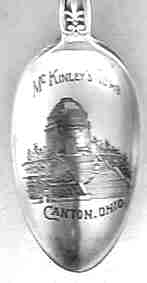
McKinley Tomb, Canton, Ohio
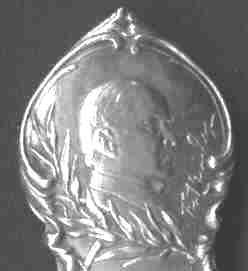
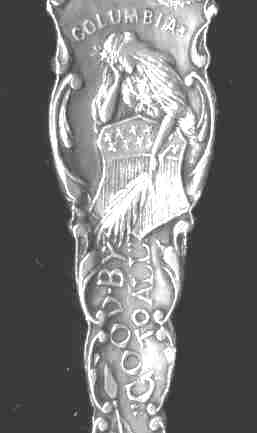
President McKinley was at the Pan American Fair in Buffalo, New York shaking hands with the public when an assassin rushed up and shot him. He died shortly thereafter.
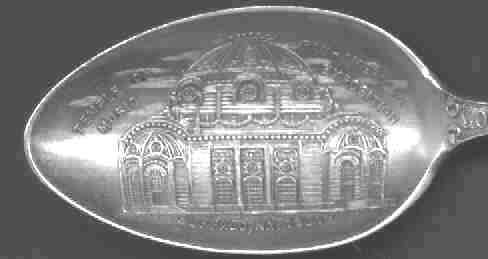
There are many spoons showing the "temple of music" building from this fair which was where he was at when the tragedy occurred.
The picture of the "weeping statue of Columbia" is unusual with the phrase "good-bye to all"
The front also has the phrase "God's will be done-not ours"

In honor of Pres. McKinley, a monument was erected in Buffalo, New York
More information on the Buffalo Pan Am Fair of 1901 may be accessed from the main spoon index and the world fair index.
Early in 1898 two events occurred that left McKinley helpless to avoid war with Spain. The first was a private letter written by the Spanish minister in Washington, D.C. Intercepted by a Cuban, who turned it over to a reporter, the letter was published in American newspapers. In it the minister, De Lo^me, called McKinley "a would-be politician ... weak and a bidder for the admiration of the crowd. ... " Though the minister promptly resigned and the Spanish Government apologized, the De Lo^me letter turned popular opinion even more strongly against Spain.
Then, a few days later, the United States battleship Maine was blown up in Havana harbor, with a loss of 260 American lives. Newspapers across the country blazed the headline that Spain was responsible and that war was now certain. Actually, no one knows, to this day , what caused the disaster. But without waiting further, Congress rushed through a bill appropriating $50,000,000 for national defense.
Though McKinley continued to press for peace, Congress and the vast majority of the American public were convinced that war was the only honorable road left open to the United States. A popular newspaper cartoon of the day showed an angry Uncle Sam straining to fight Spain while the President held him back by the coattails. The caption read, "Let go of him, McKinley!"
Soon the President feared that unless he gave way, Congress would declare war over his head. Finally he decided to yield to popular demand, and in April, 1898, war with Spain was declared. Yet McKinley always felt that, left to himself, "I could have concluded an arrangement with the Spanish government under which the Spanish troops would have been withdrawn from Cuba without a war."
The Spanish-American War lasted less than four months and resulted in a victory for the United States. The United States won control over the former Spanish possessions of Puerto Rico, Guam, Hawaii and the Philippines, while Cuba gained its independence.
Click for spoons relating to the Spanish American War and the Battleship Maine
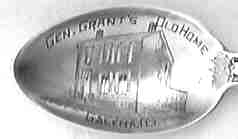
General (President) Grant came from a humble background in Galena, Illinois. He gained widespread admiration for being a successful Civil War General and was elected President in 1868 and again in 1872. His Presidency was marred by widespread corruption and scandal. History has not been kind to President Grant and today he is considered to be one of the lesser presidents.
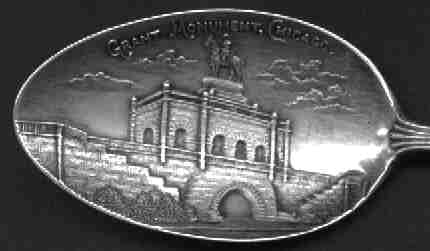
Grant Monument, Chicago, Illinois dated 1905
A spoon from the William Jennings Bryan 1900 Presidential Campaign against Pres. McKinley is shown and described in the POLITICAL SPOONS EXHIBIT